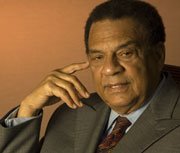by Timothy Noah
 Andrew Young's outrageous slur against Jews, Arabs, and Koreans lost him his job as Wal-Mart's goodwill emissary, but in the days since the remarks by the former U.N. ambassador, Atlanta mayor, and aide to Martin Luther King Jr., surfaced in the Los Angeles Sentinel, a black-owned weekly serving that city's African-American population, various commentators have rushed to defend, explain, or otherwise minimize what Young said.
Andrew Young's outrageous slur against Jews, Arabs, and Koreans lost him his job as Wal-Mart's goodwill emissary, but in the days since the remarks by the former U.N. ambassador, Atlanta mayor, and aide to Martin Luther King Jr., surfaced in the Los Angeles Sentinel, a black-owned weekly serving that city's African-American population, various commentators have rushed to defend, explain, or otherwise minimize what Young said.Among these apologists is Young himself, who since issuing an official mea culpa (reprinted, highlighted, and annotated below) has been signalling that this is all a meangingless game of racial politics at which he, a longtime civil rights leader, is, notwithstanding his momentary bêtise, a consummate player.
This cynical view is lent some credence by the depressingly predictable failure of the various groups representing Jews, Arabs, and Koreans to band together for a joint protest condemning Young's offense against all three. (An attack against one ethnic group is not, sadly, seen as an attack against all.) Instead, the Korean American Association of Greater Atlanta requested and was granted a meeting with Young, at which Young apologized for offending Korean-Americans.
The Atlanta chapter of the American Jewish Committee hopes to meet with Young as early as next week, according to the Atlanta Journal-Constitution, so Young can apologize to it for offending Jews. And Haitham M. Haddad, identified by the Journal-Constitution as "a member of the Arab-American community," is working on setting up a meeting at which Young can apologize for offending Arabs.
No word on whether the Rev. Joseph E. Lowery, who succeeded King and Ralph Abernathy as president of the Southern Christian Leadership Conference, will get a meeting too. Lowery publicly took offense at what his former colleague Young said. But as an African-American, Lowery was speaking not against bigotry toward the black community, but rather against bigotry toward three groups to which he does not belong. His charmingly old-fashioned protest, grounded not in injury but in principle, can safely be ignored.
Here is the passage from Young's interview with Yussuf Simmonds, managing editor of the Los Angeles Sentinel, that caused offense:
When asked about Wal-Mart moving into areas and displacing the "mom-and-pop" stores, Young had this response. "Well, I think they should; they ran the 'mom-and-pop' stores out of my neighborhood. But you see those are the people who have been overcharging us—selling us stale bread and bad meat and wilted vegetables. And they sold out and retired to Florida. I think they've ripped off our communities enough. First it was Jews, then it was Koreans and now it's Arabs. Very few Black folks own these stores."
Various African-American writers, including the estimable Clarence Page and Erin Aubrey Kaplan, have suggested that what Young was trying to say, in his admittedly ham-handed way, was that blacks historically have not owned the mom-and-pop stores in black neighborhoods, and that this is a source of legitimate frustration in the black community. A perfectly valid point, but not, you'll notice, the one that Young made in the interview. Young didn't say that more blacks ought to own mom-and-pop grocery stores in black neighborhoods; he said that the people who have owned and operated these stores have "been overcharging" blacks for "stale bread and bad meat and wilted vegetables" and then "sold out and retired to Florida." They have "ripped off our communities." They have done this, Young implied strongly, because they are not themselves black.
Not one iota of evidence suggests that the economic and racial exploitation Young attributes to Jews, Arabs, and Koreans has any basis in fact. Where are these Koreans who are getting rich off the stores they open up at 8 a.m. and close at 11 p.m.? Nobody's spotting them in Palm Beach, cackling over the fortunes they amassed with appalling speed. Like the Jews and Arabs who preceeded them, they are attempting to gain a tenuous footing in the middle class. They are hoping to send their children to college. If this is exploitation, one need question the competence of the exploiters, because they have paltry gains, ill-gotten or otherwise, to show for their treachery.
One can well understand how inner-city customers, who usually have even less, would come to resent the outsiders' profit margins, no matter how negligible. But Young didn't describe this resentment. He expressed it, and he made untrue accusations against specific ethnic groups to encourage it, all in the service of giving the corporation he worked for an easier time locating its megastores in low-income black neighborhoods.
In the Sentinel interview, Young said that Wal-Mart "should" displace mom-and-pop stores. No doubt he's correct that Wal-Mart can provide some of the same goods to inner-city consumers at lower prices. But that's only because Wal-Mart doesn't aspire to provide its employees a minimally decent standard of living.
(Economies of scale, of course, also lend an advantage.)
Whether the result is a net benefit to low-income blacks I leave to others to decide. But Wal-Mart's stinginess is no reason to judge harshly inner-city shop owners of any race who seek some sliver of economic security.
No comments:
Post a Comment